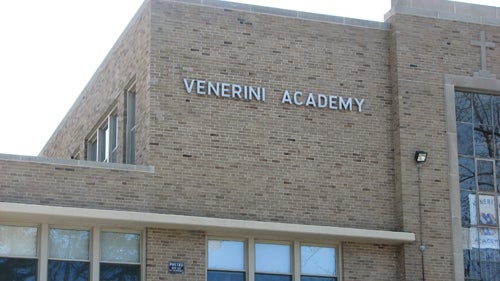It doesn’t get much lower than stealing from nuns and children, but that’s exactly what Attorney General Martha Coakley charged Michael Hlady of Rhode Island with earlier this month. And the Venerini Academy in Worcester is only one of the victims.
Having been promised as much as $14 million, the Roman Catholic order of nuns that run the Venerini Academy undertook a $3 million expansion there and paid Hlady $370,000 for connecting the school with a mysterious benefactor.
Based upon the idea that the money was forthcoming, the K-8 school signed contracts for the construction project, Coakley said at a press conference announcing Hlady’s arrest. Demolition began last June. By last fall, construction at the school was stopped when the contractors on the project began complaining to Worcester authorities about being unpaid.
In charging Hlady with larceny, Coakley said it appears as if the benefactor Hlady told Venerini “wanted to remain somewhat anonymous” and would donate millions to the school didn’t really exist.
If You Build It
Local construction firms said being unpaid is a scary, but very real prospect. In recent years, contractors have become more strict and thorough about clients’ ability to pay.
“It’s really a legal question,” said John Brown, director of sales at Marois Bros., a construction firm based in Worcester. “Every contract has different language in it, and any contractor should have it checked with a lawyer.”
Brown said it’s common in commercial construction for contractors to get to work on a project without first being paid.
“You’re often not paid until you do a certain amount of work, and then you’ll get paid monthly,” he said.
Still, contracts can be confusing, and Brown has seen contractors wondering why their payments are being held up.
Fred Mulligan, chairman of Cutler Associates, a Worcester-based contractor, said construction firms have to act as if they’re project underwriters.
“It’s shocking to me when someone commits fraud,” Mulligan said. He said that shock may be a leftover from a time when construction projects could be carried through on a handshake. Today’s construction industry is much different, and even though Venerini Academy wasn’t trying to defraud the contractors working on its expansion, those contractors may have had opportunities to confirm whether the school could pay.
“There are very few options to try to recover from that. So, you have to do almost an underwriting on projects. More and more, we’re doing that, and it used to be that you didn’t have to do that. You can’t check everything, you would not get anything done,” Mulligan said.
But keeping an eye out for credit problems is just good business, he said.
A construction firm can overcome project delays or difficulties caused by the weather or faulty technology. “Maybe you lose four or five days, and you make it up,” Mulligan said.
But a client’s credit problems can be insurmountable.
“Credit problems can be catastrophic. If someone comes to you and says, ‘I can’t pay you,’ that’s not an incremental problem,” Mulligan said.
Sister Sandra Napier, Venerini’s principal declined to comment for this story.

